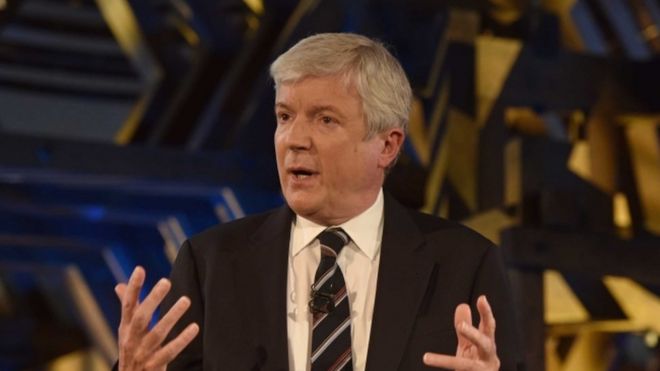
The BBC’s political independence has been gradually eroded, according to the corporation’s director general.
In a speech to business leaders on Monday, Tony Hall will urge changes to the way the broadcaster is regulated.
He wants licence fee payers to have a greater say than politicians.
Lord Hall says there has been a “major change” over the past 20 years which has made the foundations of the BBC’s independence “weaker”. The government has yet to comment.
“When I was working in news and current affairs in the ’90s, the independence of the BBC was protected by a set of quiet customs and traditions,” he will say.
“Back then it was Willie Whitelaw who’d provided us with the certainty of a 15-year Charter, underpinning our independence by allowing us stability through the political cycle.
“When I returned to the BBC as director general, I was struck by a major change. The foundations of the BBC’s independence had become weaker. The traditions and informal arrangements which protected it had been eroded.”
Behind closed doors
He cites the decision to fund government programmes such as digital switchover, rural broadband and local TV as examples of how the licence fee should not have been used.
He also suggests recent licence fee settlements have been decided behind closed doors without a “full process”.
Future licence fee negotiations should, he says, be made with the input of licence fee payers possibly by an online vote.
The speech to the Cardiff Business Club comes in the midst of negotiations for the corporation’s next 10-year charter.

The BBC was criticised for buying in The Voice format as it was too similar to ITV’s X Factor. It has now been sold to another broadcaster
The Department for Culture, Media and Sport is reviewing the size and scope of the BBC and what sort of programming the corporation should provide. One key part of the process is deciding who should oversee and regulate the corporation.
The current system, a BBC Trust, is both a watchdog and also the decision-making body controlling the size and strategy of the corporation.
Lord Hall, echoing the current BBC chairman, Rona Fairhead, says the roles should be split and the BBC should for the first time have an external regulator.
‘Sword of Damocles’
He also says the new BBC Charter should not say what programmes the BBC should be allowed to make nor should they be told to back away from output or ventures deemed to be too promising or popular.
“If, having cut our money, the charter also cuts our creative freedom to reinvent our services, or our commercial freedom to make up the shortfall… Letting this happen would not just have unintended consequences for the BBC, but for the UK’s creative economy as a whole.
“Some might think, for example, that a call for us to focus only on content sounds reasonable. But 10 years ago that kind of prescriptive regulation would have prevented the BBC from investing in Freeview or creating the iPlayer. And it would have meant none of the ripple effects of that investment, which helped to create a new market for video-on-demand and benefit all players.”
And he adds that the suggestion, made by some, that the BBC should renew its charter every five years would be a “sword of Damocles” in which the BBC’s existence could be threatened at every election.
Instead, he is calling for the charter period to be extended to 11 years, which would take it out of the electoral cycle and that any changes to the system should only be changed in Parliament with a two thirds majority and a vote by licence fee payers.
BBC
 Q FM Africa's Modern Radio
Q FM Africa's Modern Radio